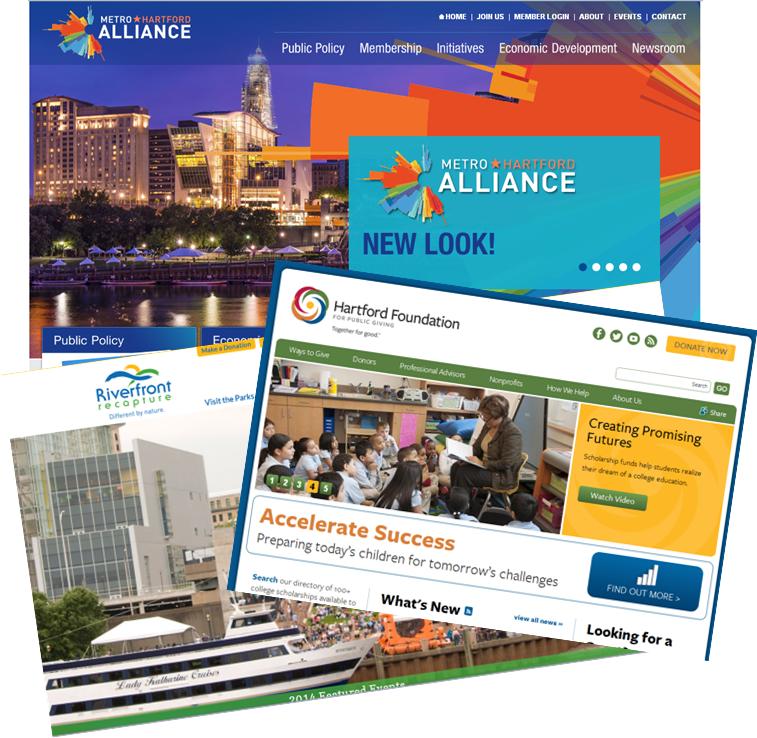Hartford Foundation’s Record-Breaking Grantmaking Topped $38 Million in 2018
/The Hartford Foundation for Public Giving, the community foundation for 29 communities in Greater Hartford, awarded more than $38 million in grants to the region’s nonprofit agencies and educational institutions in 2018.
“At a time when our state and many of our communities face significant fiscal challenges, the Hartford Foundation was able to award a record breaking number of grants this past year,” said Hartford Foundation president Jay Williams. “We continue to look for ways to work together with our donors, nonprofits, and community partners to ensure Greater Hartford residents have access to opportunities that enrich their lives and secure a better future for our region.”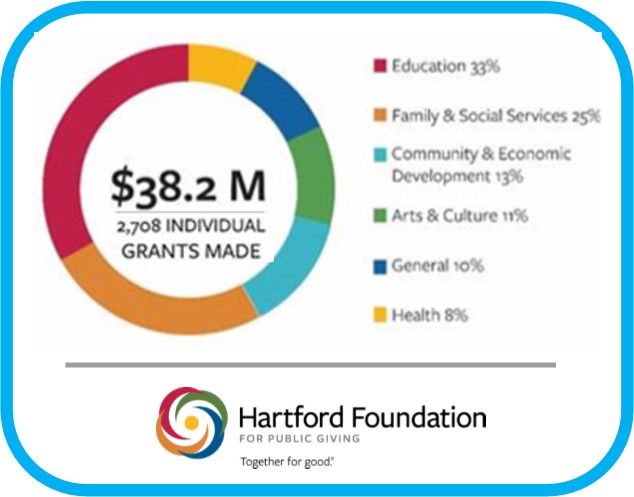
According to the latest estimated, unaudited numbers, the Foundation ended 2018 with total assets of $933 million in 1,230 funds. The Foundation received gifts totaling $13.1 million and opened 22 new funds.
“Greater Hartford is fortunate to have so many generous residents who truly want to make a lasting difference in their community,” Williams said. “The historic amount of resources we have been able to provide to hardworking and dedicated nonprofit organizations is a testament to our donors’ level of commitment to the region and the work the Hartford Foundation supports.”
Officials noted that the Foundation’s 2018 grantmaking - with a total of 2,708 individual grants made - was based on the recognition that "a vibrant and strong Greater Hartford region requires that all residents, especially those with the greatest need, have equitable access to opportunities to achieve and flourish." The largest percentage of grants were in education (33%), followed by family & social services (25%), communication and economic development (13%), and arts & culture (11%).
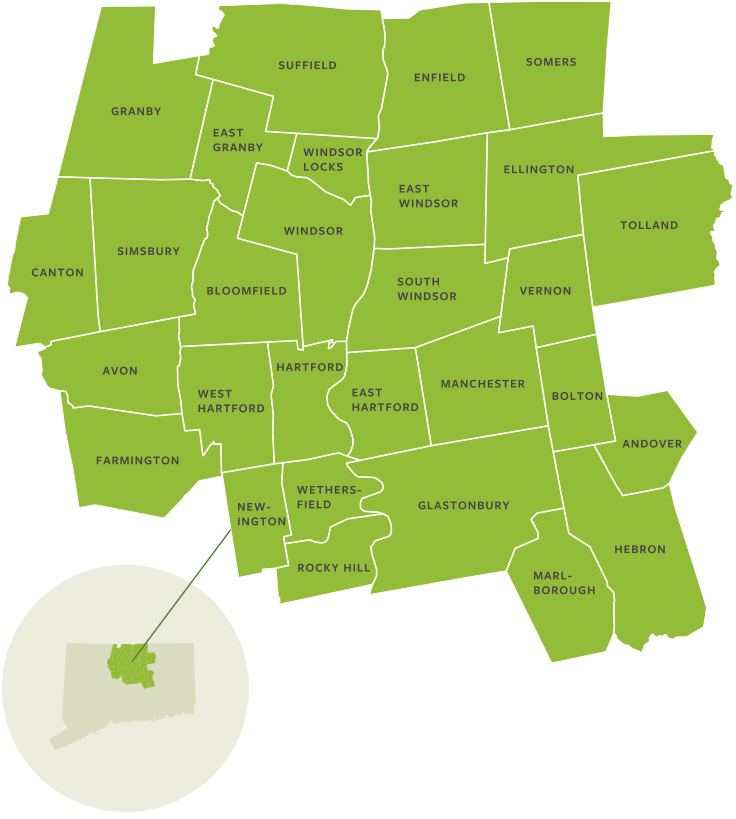 Among the grants, in each program area:
Among the grants, in each program area:
Education
- Hartford Student Internship Program - The Foundation awarded a $200,000 grant to Capital Workforce Partners to provide 150 Hartford rising high school juniors and seniors with internships and other work-based learning opportunities. The Foundation’s support extends opportunities to students with a variety of backgrounds, including students who have become disconnected from school.
- Summer Learning Programs - In an effort to enhance summer learning and youth development, the Foundation provided $805,300 to support 34 campership, nine tutorial, nine Counselor-in-Training and five enrichment summer programs. Foundation funding supported free and reduced-cost access to summer programming, as well as targeted support for literacy, parent engagement and other enhancements for nearly 11,000 youth from across the region.
- Early Development Instrument - The Foundation awarded a $50,000 grant to East Hartford Public Schools to support projects based upon the findings of the 2018 Early Development Instrument (EDI), a population-based measurement tool that assessed the school readiness of East Hartford kindergarten students. Foundation funds will pay for the Transition to Kindergarten Campaign; an EDI Olympics for 8 elementary schools; capacity building of community and home day care providers; and project materials.
Family and Social Services
- Community Safety Coalition - With a $160,000 grant from the Foundation, five local nonprofit agencies have created the Hartford Community Safety Coalition (CSC) as an organic response to the rising incidence of violent crime in Hartford. The coalition’s mission is to create healthy communities by collaborating on strategies to reduce urban violence and trauma in Hartford.
- Center for Children’s Advocacy - With the support of a three-year $260,000 grant, the Center for Children’s Advocacy is expanding its services to adolescents and young adults from Greater Hartford transitioning out of justice-system confinement or Department of Children and Families involvement. Foundation funds support a portion of the salaries for two project attorneys and a case manager. A portion of the grant can be used to support the Center’s administrative advocacy work with state agencies including the Department of Children and Families, the Department of Education and the justice system.
Community and Economic Development
- Get Out the Vote - This past August, the Hartford Foundation for Public Giving awarded thirteen grants totaling $116,565 to area nonprofits dedicated to informing and engaging underrepresented voters in Greater Hartford. This nonpartisan effort focused primarily on young adults, Latinos and Black residents and people living in high poverty neighborhoods. Over a three-month period, these organizations reached out to several thousand Greater Hartford residents, registering over 1,000 new voters and receiving 1,500 pledges to participate in the November 6 elections.
- LISC Hartford - The Building for Health Project is focused on coordinating housing quality improvements (including lead remediation, energy efficiency, asthma triggers and others), providing technical assistance and grants to affordable housing builders/managers to help implement healthy practices in the buildings they manage. The Foundation provided a three-year, $313,000 grant to support Building for Health, which is a collaborative effort that came out of one of the Foundation’s 2017 innovation planning grants. The project involves a partnership between utilities, hospitals, community development corporations and nonprofit lenders to build the connections between health and housing.
Arts and Culture
- TheaterWorks - TheaterWorks strives to bring in a more diverse audience, one that is more representative of the community at large and more inclusive of Hartford residents. TheaterWorks commissioned a market study in 2017 that found gaps in the arts programming available in the Hartford area, specifically in the areas of music, dance, film and spoken word. To support its ongoing strategic planning process, TheaterWorks was awarded a planning grant to develop, test and evaluate new pilot programs that would help diversify its audience while also filling these gaps.
- Hartford Stage Company - The Hartford Stage Company’s Breakdancing Shakespeare program provides students between the ages of 14 and 18 with the opportunity to be part of a unique program that combines the text of a classic Shakespearean play with the language of hip-hop, rap and breakdancing. With the support of a $15,000 grant from the Beatrice Fox Auerbach Foundation Fund at the Hartford Foundation, students participated in a six-week rehearsal process, taking master classes with guest artists, developing skills related to the program’s first-ever production of Twelfth Night.
- Connecticut Historical Society - The Cheney Family Fund at the Hartford Foundation provided a $3,000 grant to the Connecticut Historical Society to support “Facing War: Connecticut in World War I.” The exhibit displays hundreds of photographs from 1917-1919, many displayed for the first time and many in life-size, as well as letters, diaries, propaganda posters, clothing, uniforms and equipment. The exhibit focuses on the personal stories of 12 Connecticut individuals, including George W. Cheney, who served on the front lines in France for nine months.
Health
- Newton C. and Elsie B. Brainard Fund - For more than 50 years, families have been able to avoid financial ruin caused by medical bills with support from the Newton C. and Elsie B. Brainard Fund at the Hartford Foundation for Public Giving. The Brainard Fund benefits residents of Greater Hartford who have assets to preserve, but who face medical and health care costs that would otherwise have devastating financial consequences. In 2018, 21 families’ medical cases were supported by grants totaling nearly $224,328.
- Hockanum Valley Community Council - In response to a growing demand for substance abuse treatment, the Foundation awarded a three-year, $127,752 grant to the Hockanum Valley Community Council (HVCC). HVCC established a Medication Assisted Treatment program (MAT) in 2013 for residents of Vernon and nearby towns with opioid addiction. As one of the few providers offering this service regardless of a patients’ ability to pay, HVCC’s program has reached full capacity, growing from 32 to 52 clients in the past year alone. This grant is being used to support the hiring of an advanced practice clinician, which will allow HVCC to increase the number of clients served while increasing the quality of care and improving patient outcomes.
Nonprofit Capacity Building
- The Nonprofit Support Program (NSP) - The Foundation’s Nonprofit Support Program helps strengthen nonprofit organizations in our region by providing tools and knowledge for agencies to build strong boards, plan for their futures, evaluate programs, improve finances and update technology. In 2018, 49 staff and board teams participated in the Social Enterprise Accelerator, 15 agency teams took part in the Fundraising Training Program, 13 teams completed the Financial Management Training Program, 23 nonprofit teams received strategic technology training, 17 agency teams completed the Building Evaluation Capacity Program, and 39 executive directors and staff leaders participated in leadership development programs. In addition, 73 grants totaling $2 million were awarded to support technical assistance (such as strategic planning and board development), strategic technology, financial management, and evaluation within our local nonprofits. Eight nonprofits successfully transitioned to new leaders with support from the Executive Transition Program. In total, NSP provided services to over 1,000 individuals representing over 450 nonprofits during the year.
- Small Agency Grant Program - In 2018, the Foundation expanded grants to small and minority-led organizations through its Small Agency Grant Program. Eleven organizations successfully completed the Building on Success program that helps smaller nonprofit organizations grow to their next strategic level. Through the Small Agency Community Partners component, the Foundation has worked with 14 other nonprofit support organizations to increase the number and access to resources available to help strengthen small organizations. Highlights include a new “Board Member Bootcamp” with Leadership Greater Hartford and Hartford Public Library, and a “QuickBooks Basics for Nonprofits” with the Small Business Administration and Hartford Public Library.
Since its founding in 1925, the Foundation has awarded more than $758 million in grants.


 The Foundation invested 30 percent of its grants in education from birth through high school, and new and renewed college scholarship, according to the report. Grants for family and social services received 20 percent; health – 11 percent; arts and culture – 11 percent; community and economic development – 19 percent, general – 5 percent and summer programs – 4 percent.
The Foundation invested 30 percent of its grants in education from birth through high school, and new and renewed college scholarship, according to the report. Grants for family and social services received 20 percent; health – 11 percent; arts and culture – 11 percent; community and economic development – 19 percent, general – 5 percent and summer programs – 4 percent.
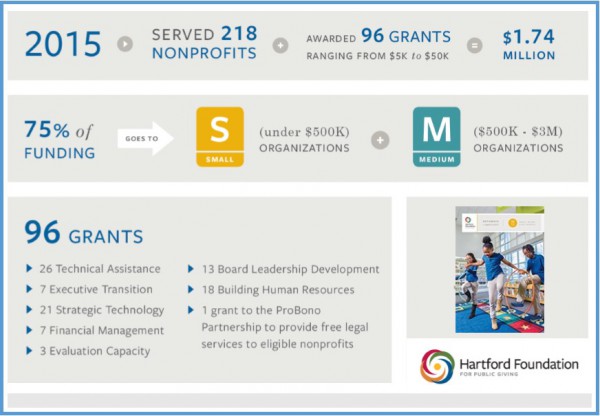
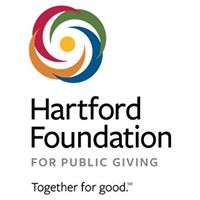
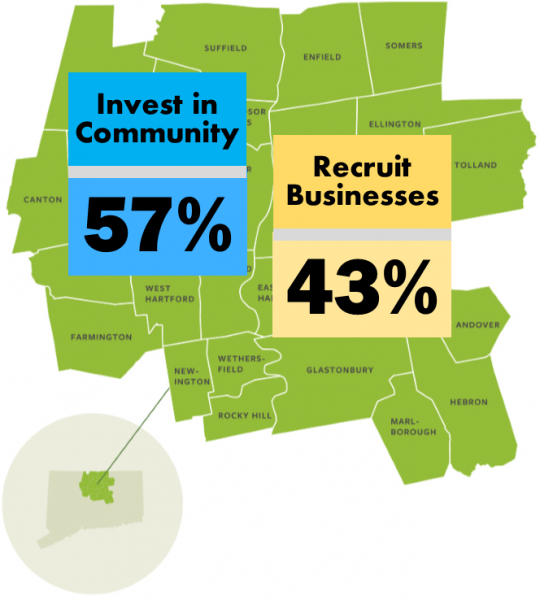 The data from the survey reflect a difference of opinion among older residents of the region. Individuals over age 46 took the opposite view from younger residents, with a majority expressing a preference for spending skewed toward recruiting companies. The reversal was dramatic, with two-thirds of those age 36-45 preferring investing in communities, by a margin of 67%-33%, and individuals age 46-55 expressing a preference for resources to be aimed at recruiting companies, with two-thirds holding the opposite view, 63%-38%.
The data from the survey reflect a difference of opinion among older residents of the region. Individuals over age 46 took the opposite view from younger residents, with a majority expressing a preference for spending skewed toward recruiting companies. The reversal was dramatic, with two-thirds of those age 36-45 preferring investing in communities, by a margin of 67%-33%, and individuals age 46-55 expressing a preference for resources to be aimed at recruiting companies, with two-thirds holding the opposite view, 63%-38%.

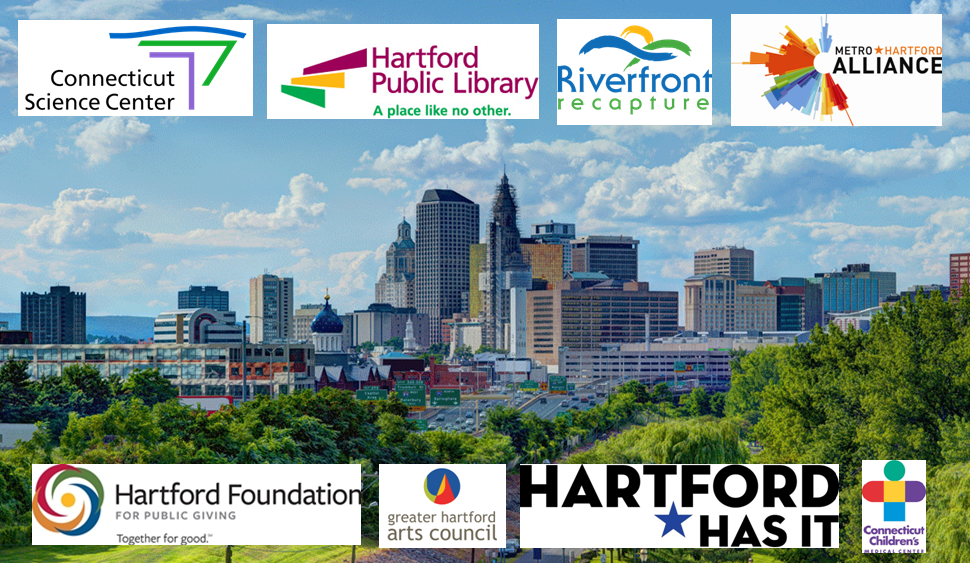 ative way the Hartford Foundation works and the permanence and stability that the 89-year old organization provides to the community.
ative way the Hartford Foundation works and the permanence and stability that the 89-year old organization provides to the community.